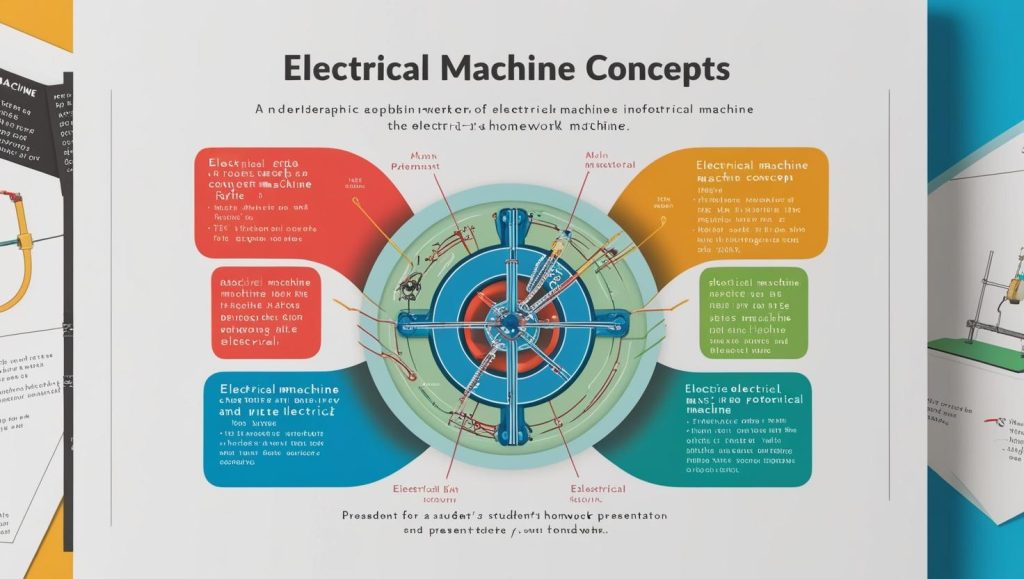Introduction
Electrical machines are the backbone of modern electrical engineering, playing a crucial role in power generation, transmission, and distribution. From motors and generators to transformers, these machines are used in various industrial and commercial applications. However, students often find electrical machines challenging due to their complex mathematical modeling, circuit analysis, and electromagnetic principles. If you’re seeking Electrical Machines Homework Help, this guide provides valuable insights, study resources, and expert assistance to help you succeed in your coursework.

Understanding Electrical Machines
Electrical machines convert electrical energy into mechanical energy (motors) or vice versa (generators). These machines operate based on electromagnetic induction, Faraday’s Law, and principles of electromechanical energy conversion.
Types of Electrical Machines
- DC Machines
- DC Motors (Shunt, Series, Compound)
- DC Generators (Separately Excited, Self-Excited)
- AC Machines
- Synchronous Machines (Alternators, Synchronous Motors)
- Induction Machines (Single-phase and Three-phase Induction Motors)
- Transformers
- Power Transformers
- Distribution Transformers
- Auto-transformers
Challenges Students Face in Electrical Machines Assignments
- Complex Mathematical Equations: Differential equations, phasor analysis, and Laplace transforms.
- Circuit Analysis: Understanding equivalent circuits, per-unit systems, and impedance calculations.
- Magnetic Circuits and Electromagnetism: Concepts like flux linkage, magnetic hysteresis, and core losses.
- Machine Performance and Testing: Load characteristics, efficiency calculation, and performance curves.
- Simulation and Practical Implementation: MATLAB, Simulink, and ANSYS Maxwell software for analyzing machine behavior.
How to Excel in Electrical Machines Homework
1. Utilize Online Learning Resources
Leverage these online platforms for in-depth study materials:
2. Refer to Standard Textbooks
Some recommended books include:
- “Electric Machinery” by A.E. Fitzgerald, Charles Kingsley, and Stephen D. Umans.
- “Electrical Machines, Drives, and Power Systems” by Theodore Wildi.
- “Principles of Electric Machines and Power Electronics” by P.C. Sen.
3. Practice with Simulation Software
Hands-on experience with MATLAB, Simulink, PSCAD, and ANSYS Maxwell enhances understanding and application.
4. Seek Professional Homework Help
If you struggle with assignments, consider professional tutoring services:
- Chegg
- TutorMe
- Udemy
5. Join Online Forums and Study Groups
Engage in discussions on platforms like:
6. Work on Real-World Projects
Practical projects such as designing an induction motor model or analyzing transformer efficiency can strengthen your understanding.
Importance of Electrical Machines in Engineering
- Power Generation: Essential in hydro, thermal, and nuclear power plants.
- Industrial Automation: Used in robotics, conveyor belts, and manufacturing processes.
- Electric Vehicles: Induction motors and BLDC motors power modern EVs.
- Renewable Energy Systems: Key components in wind and solar power generation.
- Home Appliances and Commercial Use: Found in HVAC systems, elevators, and pumps.
Conclusion
Mastering electrical machines requires a solid grasp of fundamental principles, circuit analysis, and hands-on simulation. If you need Electrical Machines Homework Help, utilize online courses, textbooks, simulation tools, and expert tutoring services. These resources will help you develop a strong foundation in electrical machines and excel in your assignments.


